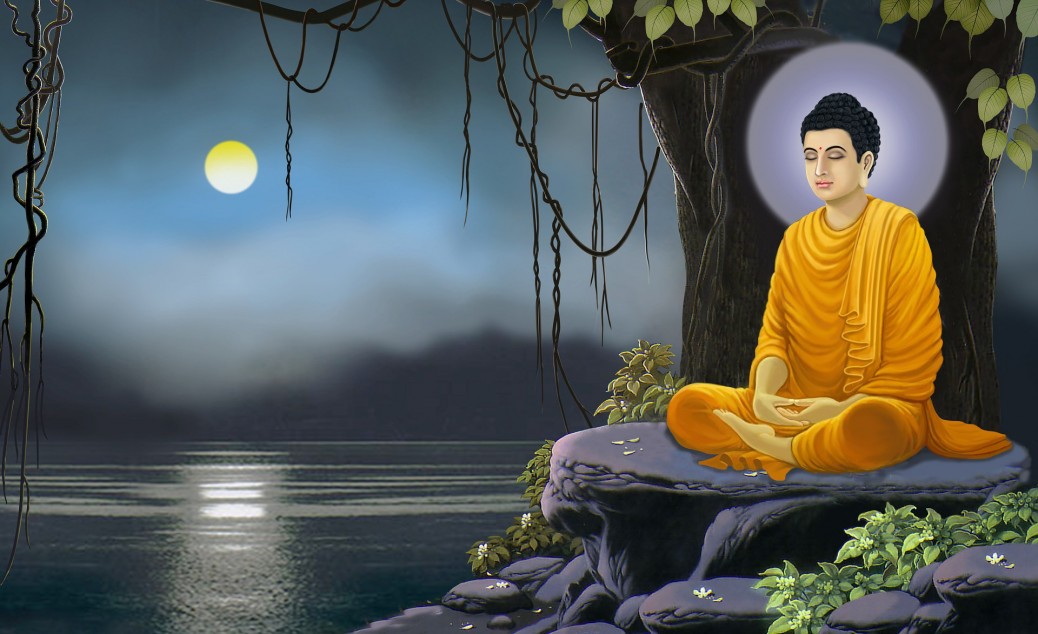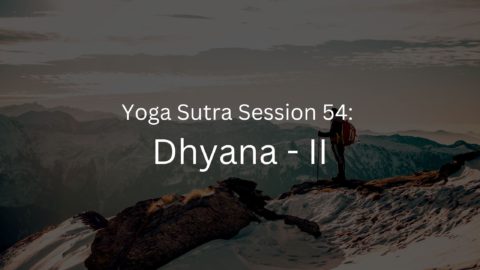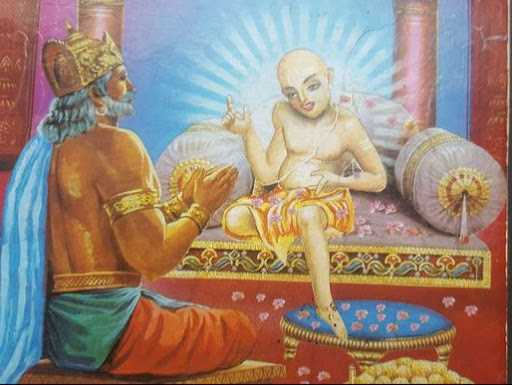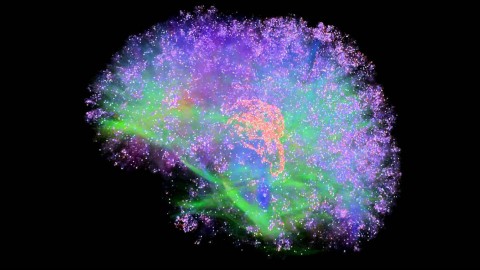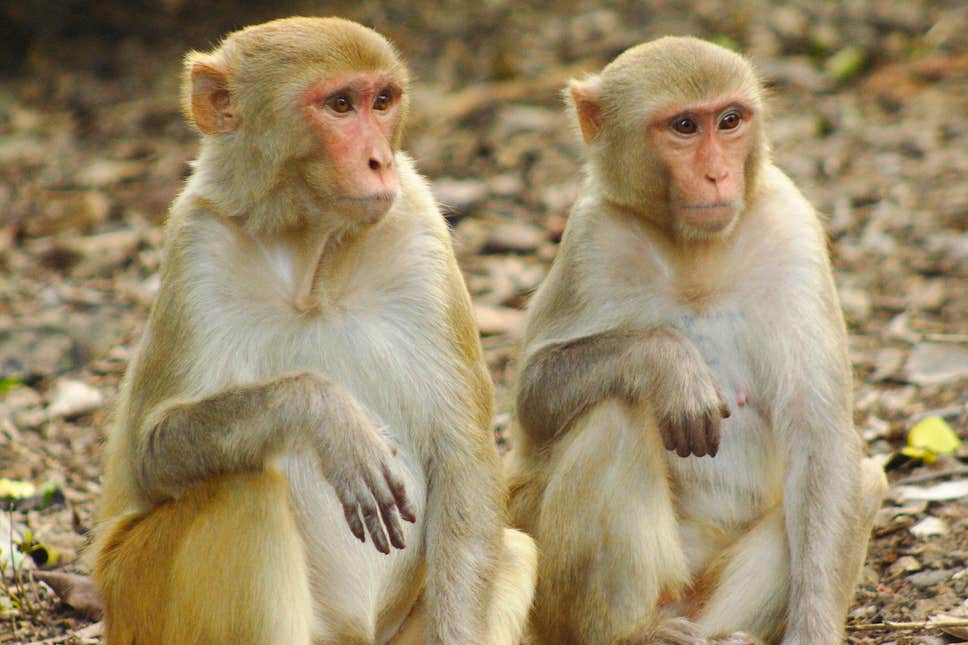WHEN POSTURE IS MASTERED THERE IS A CESSATION OF THE DISTURBANCES CAUSED BY DUALITIES.
When the body is really in comfort, restful, the flame of the body is not wavering – it has become steady, there is no movement – suddenly, as if time has stopped, no winds blowing, everything still and calm and the body has no urge to move – settled, deeply balanced, tranquil, quiet, collected: in that state, dualities and the disturbances caused by dualities disappear.
Have you observed that whenever your mind is disturbed your body fidgets more, you cannot sit silently?… Or, when ever your body is fidgeting your mind cannot be silent? They are together. Patanjali knows well that body and mind are not two things; you are not divided in two, body and mind. Body and mind are one thing. You are psychosomatic: you are bodymind. The body is just the beginning of your mind and the mind is nothing but the end of the body. Both are two aspects of one phenomenon; they are not two. So whatsoever happens in the body affects the mind and whatsoever happens in the mind affects the body.
They run parallel. That’s why so much emphasis on the body, because if your body is not in deep rest your mind cannot be.
And it is easier to start with the body because that is the outermost layer. It is difficult to start with the mind. Many people try to start with the mind, and fail, because their body will not cooperate. It is always best to begin from A, B, C, and go slowly, in the right sequence. Body is the first, the beginning: one should start with the body. If you can attain the tranquility of the body, suddenly you will see the mind is falling in order.
Mind moves to the left and to the right, goes on like a pendulum of an old granddad’s clock: continuously, right to left, left to right. And if you observe a pendulum you will know something about your mind. When the pendulum is moving towards the left, visibly it is going to the left, but invisibly it is gaining momentum to go to the right. When the eyes say that the pendulum is going to the left, that very movement towards the left creates the momentum, the energy, for the pendulum to go to the right again. When it is going to the right it is again earning energy, gaining energy to go to the left.
So whenever you are in love, you are gaining energy to hate. Whenever you are in hate, you are gaining energy to love. Whenever you are feeling happy, you are gaining energy to feel unhappy. Whenever you are feeling unhappy, you are gaining energy to feel happy. This is how the momentum continues.
I have heard that when India became independent in 1947, there was a beautiful elephant in Delhi. Before independence the elephant was used in wedding processions and other things like that, but after the independence even political parties started using the elephant in their rallies, processions, protests. The elephant had something like a flaw. The legs on his left side were a little shorter, so when the elephant walked he would lean towards the left.
Communists were very happy, socialists were very happy – the elephant was leftist. So they paid money to the owner to borrow the elephant; and they clapped, and their followers threw flowers on the elephant. Really, this is how an elephant should be – leftist. Of course, it was very difficult for the elephant to walk, but who bothers about the elephant? It was difficult because two legs were small, and the whole burden was falling on the left legs. An elephant has a lot of weight; it was difficult. Tons of weight have to be carried. But flowers, garlands… and he was received, and photographs were published in newspapers: that this is a communist elephant.
Seeing that – that communists and socialists and other leftists have a beautiful elephant, even rightists, when their time of procession and rally came, they also borrowed the same elephant – not knowing that the elephant is a leftist elephant.
When the elephant went with the rightists they were very angry. This elephant was against them: he should lean towards the right. They started throwing old shoes, tomatoes, banana peels, and all rotten things. In short, they gave him a VIP treatment. They were very angry. They were angry at the owner also, and they told the owner, “Next time we take it, you make arrangements.”
So the owner had to make arrangements because he lived on the elephant; that was his only earning. So he made big shoes. Then whenever it w as a rightist procession he would put on the big shoes, and the animal would lean towards the right; and whenever it was a leftist procession, he would remove the shoes.
Nobody bothered about the elephant. One day the elephant fell, just in Connaught Place, because it was too much to carry that big load with shoes. And it was so uncomfortable – it was not an asan. It was really uncomfortable. He fell and died.
This is the situation of your mind also: continuously moving from one extreme to another – leftist, rightist, leftist, rightist – never in the middle. And to be in the middle is really to be. Both extremes are burdensome, because you cannot be comfortable. In the middle is comfort, because in the middle the weight disappears. Exactly to be in the middle – and you become weightless. Move to the left and the weight enters; move to the right and the weight enters. And go on moving… the farther away you move from the middle, the more weight you will have to carry. You will die someday in some Connaught Place.
Be in the middle. A religious man is neither leftist, nor rightist. A religious man does not follow the extremes. He is a man of no extreme. And when you are exactly in the middle – your body and your mind both – all dualities disappear, because all dualities are because you are dual, because you go on leaning from this side to that.
“TATO DWANDWA ANABHIGHATAH” – “When posture is mastered there is a cessation of the disturbances caused by dualities.” And when there is no duality, how can you be tense? How can you be in agony? How can you be in conflict? When there are two within you, there is conflict. They go on fighting, and they will never leave you in rest. Your home is divided; you are always in a civil war. You live in a fever. When this duality disappears you become silent, centered, in the middle. Buddha has called his way “MAJJHIM NIKAYA” – the middle way. He used to tell his disciples, “The only thing to be followed is: Always be in the middle; don’t go to the extremes.”
There are extremists all over the world. Somebody is chasing women continuously – a Romeo, a Majanu – continuously chasing women. And then, someday he becomes frustrated with all the chasing. Then he leaves the world; then he becomes a sannyasin. And then he teaches everybody to be against a woman, and then he goes on saying, “Woman is hell. Be alert! Only a woman is the trap.” Whenever you find a sannyasin talking against women you can know he must have been a Romeo before. He is not saying anything about women; he is saying something about his past. Now one extreme finished, he has moved to another extreme.
Somebody is mad after money. And many are mad, just obsessed, as if their whole life is to make bigger and bigger piles of rupees. That seems to be their only meaning to be here, that when they go to death they will leave big piles – bigger than others’. That seems to be their whole significance. When such a man becomes frustrated he will go on teaching, “Money is the enemy.” Whenever you find somebody teaching that money is the enemy, you can know that this man must have been a money-mad man. Still he is mad – on the opposite extreme.
A really balanced man is not against anything, because he is not for anything. If you come and ask me, “Are you against money?” I can only shrug my shoulders.
I am not against it, because I have never been for it. Money is something, a utility, a medium of exchange – no need to be mad about it either way. Use it if you have it. If you don’t have it, enjoy the nonhaving of it. If you have it use it. If you don’t have it then enjoy that state. That’s all a man of understanding will do. If he lives in a palace he enjoys; if the palace is not there then he enjoys the hut. Whatsoever is the case he is happy and balanced. He is neither for the palace nor against it. A man who is for and against is lopsided; he is not balanced.
Buddha used to say to his disciples, “Just be balanced, and everything else will become possible of its own accord. Just be in the middle.” And that is what Patanjali says when he is talking about posture. The outer posture is of the body, the inner posture is of the mind; both are connected. When the body is in the middle – restful, steady – the mind is also in the middle – restful, steady.
When the body is in rest, body-feeling disappears; when the mind is in rest, mind feeling disappears. Then you are only the soul, the transcendental, which is neither the body nor the mind.
THE NEXT STEP AFTER THE PERFECTION OF POSTURE IS BREATH CONTROL, WHICH IS ACCOMPLISHED THROUGH HOLDING THE BREATH ON INHALATION AND EXHALATION, OR STOPPING THE BREATH SUDDENLY.
Between body and mind, breath is the bridge – these three things have to be understood. Body posture, mind merging into the infinite, and the bridge that joins them together have to be in a right rhythm. Have you observed? If not, then observe that whenever your mind changes, the breathing changes. The reverse is also true: change your breathing, and mind changes.
When you are deep in sexual passion have you watched how you breathe? – Very nonrhythmic, feverish, excited. If you continue breathing that way you will be tired soon, exhausted. It will not give you life; in fact, in that way you are losing some life. When you are calm and quiet, feeling happy, suddenly one morning or evening looking at the stars, nothing to do, a holiday, just resting – look, watch the breathing. The breathing is so peaceful. You cannot even feel it, whether it is moving or not. When you are angry, watch. The breathing changes immediately. When you feel love, watch. When you are sad, watch. With every mood the breathing has a different rhythm: it is a bridge.
When your body is healthy, breathing has a different quality. When your body is ill the breathing is ill. When you are perfectly in health you completely forget about breathing. When you are not in perfect health the breathing comes again and again to your notice; something is wrong.
“The next step after the perfection of posture is breath control….” This word “breath control” is not good; it is not a right rendering of the word “Pranayam.”
Pranayam never means breath control. It simply means the expansion of vital energy. Prana-ayam: prana means the vital energy hidden in breath, and ayam means infinite expansion. It is not “breath control.” The very word “control” is a little ugly, because the very word “control” gives you a feeling of the controller – the will enters. Pranayam is totally different: expansion of vitality breathing in such a way that you become one with the whole’s breathing; breathing in such a way that you are not breathing in your own individual way, you are breathing with the whole.
Try this, sometimes it happens: two lovers sitting by each other’s side holding hands – if they are really in love they will suddenly become aware that they are breathing simultaneously, they are breathing together. They are not breathing separately. When the woman inhales, the man inhales. When the man exhales, the woman exhales. Try it. Sometimes you suddenly become aware. If you are sitting with a friend, you will be breathing together. If the enemy is sitting there and you want to get rid of him, or some bore is there and you want to get rid of him, you will be breathing separately; you will never breathe in rhythm.
Sit with a tree. If you are silent, enjoying, delighting, suddenly you will become aware that the tree, somehow, is breathing the same way you are breathing.
And there comes a moment when one feels that one is breathing together with the whole, one becomes the breath of the whole, one is no longer fighting, struggling, one is surrendered. One is with the whole – so much so, that there is no need to breathe separately.
In deep love people breathe together; in hatred never. I have a feeling that if you are inimical to somebody, he may be a thousand miles away…. This is just a feeling because no scientific research exists for it, but someday the scientific research is possible. But I have a very deep feeling that if you are inimical to somebody, he may be in America and you may be in India, you will breathe separately, you cannot breathe together. And your lover may be in China, you may be in India – you may not even have the address with you where your lover is – but you will breathe together. This is how it should be, and I know it is that way, but no scientific proof exists. That’s why I say this is just my feeling.
Someday, somebody will prove the scientific thing also.
There are a few proofs which suggest…. For example, in Russia there have been a few experiments about telepathy. Two persons, separate, far away, hundreds of miles away: one person is the broadcaster, another is the receiver in telepathy. At a fixed time, twelve in the afternoon, one starts sending messages. He makes a copy of a triangle, concentrates on it, and sends the message that “I have made a triangle.” And the other person tries to receive, just remains open, feeling, groping – what message is coming. And scientists have observed that if he receives the triangle then they both are breathing in the same way; if he misses the triangle then they are not breathing in the same way.
In deep breathing together, something of deep empathy arises; you become one – because breath is life. Then feeling can be transferred, thoughts can be transferred.
If you go to meet a saint, always watch his breathing. And if you feel sympathetic, in deep love with him, watch your breathing also. You will suddenly feel that the nearer you come to him, your feeling, your breathing, fall with his system of breathing. Aware, unaware, that is not the point; but it happens.
This has been Osho’s observation: if he sees that somebody has come and not knowing anything at all about breathing he starts breathing with him, he knows he is going to become a sannyasin, and he asks him. If he feels that he is not breathing with him, he forgets about asking; he will have to wait. And sometimes he has tried, just for an experiment he has asked, and he will say, “No, I am not ready.” I knew it, that he is not ready – just to test whether his feeling is going right, whether he is in sympathy with him. When you are in sympathy you breathe together. It simply happens by itself; some unknown law functions.
Pranayam means: to breathe with the whole. That is my translation, not “control of breath”: to breathe with the whole. It is absolutely uncontrolled! If you control, how can you breathe with the whole? So to translate pranayam as “breath control” is a misnomer. It is not only incorrect, inadequate, it is certainly wrong.
Just the opposite is the case.
To breathe with the whole, to become the breath of the eternal and the whole is pranayam. Then you expand. Then your life energy goes on expanding with trees and mountains and sky and stars. Then a moment comes, the day you become Buddha… you have completely disappeared. Now you no longer breathe, the whole breathes in you. Now your breathing and the whole’s breathing are never apart; they are always together. So much so that it is now useless to say that “this is my breath.”
Tags: Yoga Sutra 29 Middle Is Comfort
